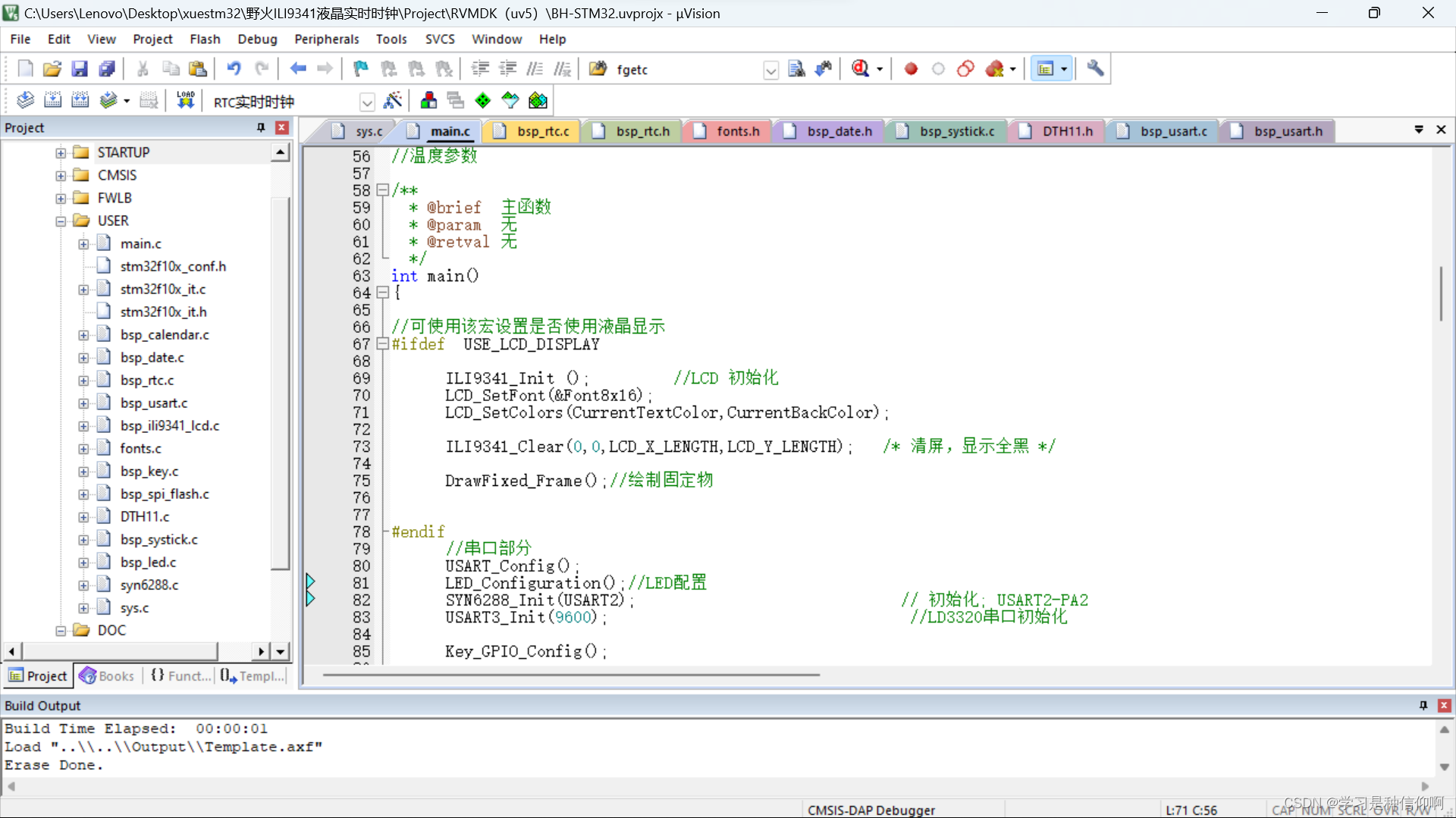智能家居 (3) ——语音识别控制端线程
目录1.工厂模式创建语音控制对象:(1)voiceControl.c 文件(语音控制)(2)command.h 文件(指令方式类)2.多线程控制——语音控制(调试):(1)main.c 文件(主函数)3.往期文章:语音识别 > 树莓派串口 > 控制设备1.工厂模式创建语音控制对象:(1)voiceControl.c 文件(语音控制)#include "command.h"//自定义类文
·
目录
语音识别 > 树莓派串口 > 控制设备
1.工厂模式创建语音控制对象:
(1)voiceControl.c 文件(语音控制)
#include "command.h" //自定义类文件
#include <unistd.h>
void voiceControlInit(struct Command *file); //“语音控制”功能初始化函数声明
int voiceControlGetCommand(struct Command *cmd); //“获取指令”函数初始化
struct Command *addVoiceControlToLink(struct Command *phead); //“语音控制”(对象)加入指令链表函数声明
struct Command voiceControl = { //定义“语音控制”对象
.commandName = "voiceControl", //名字
.deviceFilesName = "/dev/ttyAMA0", //树莓派串口文件所在地址
.command = {'\0'}, //初始化储存“指令”的空间
.Init = voiceControlInit, //指定“语音控制”功能初始化函数
.getCommand = voiceControlGetCommand, //指定“获取指令”函数
};
void voiceControlInit(struct Command *file)
{
int fd;
if((fd = serialOpen(file->deviceFilesName,9600)) == -1){ //打开树莓派串口,波特率指定为9600
exit(-1);
}
file->fd = fd; //打开串口文件成功,返回“文件描述符”到“语音控制”链节中
}
int voiceControlGetCommand(struct Command *cmd)
{
int nread = 0;
nread = read(cmd->fd,cmd->command,sizeof(cmd->command)); //读取串口
return nread; //返回读取到数据的字节数
}
struct Command *addVoiceControlToLink(struct Command *phead) //“语音控制”(对象)加入指令方式链表函数
{
if(phead == NULL){
return &voiceControl;
}else{
voiceControl.next = phead;
phead = &voiceControl;
return phead;
}
}
(2)command.h 文件(指令方式类)
#include <stdio.h>
#include <stdlib.h>
#include <string.h>
#include <wiringPi.h>
#include <wiringSerial.h>
struct Command
{
char commandName[128]; //“控制方式”名
char deviceFilesName[128]; //存放初始化所需文件的路径
char command[32]; //存放指令
int fd; //存放文件描述符
void (*Init)(struct Command *file); //“初始化”函数指针
int s_fd;
char ipAdress[32];
char port[12];
int (*getCommand)(struct Command *cmd); //“获取指令”函数指针
struct Command *next;
};
struct Command *addvoiceControlToLink(struct Command *phead); //“语音控制”加入指令链表函数声明
2.多线程控制——语音控制(调试):
(1)main.c 文件(主函数)
仅调试功能
#include <stdio.h>
#include <string.h>
#include "equipment.h"
#include "command.h"
#include <pthread.h>
#include <unistd.h>
struct Equipment *findEquipByName(char *name,struct Equipment *phead); //链节查找函数声明
struct Command *findCommandByName(char *name,struct Command *phead); //链节查找函数声明
void *voiceControl_thread(void *data); //“语音控制”线程函数声明
struct Command *cmdhead = NULL; //创建“指令”链表全局变量
int main()
{
cmdhead = addVoiceControlToLink(cmdhead); //“语音控制”对象加入链表
pthread_t voiceControl_thread_t; //存放线程 ID
pthread_create(&voiceControl_thread_t,NULL,voiceControl_thread,NULL); //创建“语音控制”线程
pthread_join(voiceControl_thread_t, NULL); //主函数等待“语音控制”线程退出
return 0;
}
void *voiceControl_thread(void *data) //“语音控制”线程
{
int nread;
struct Command *voiceHandler = NULL;
voiceHandler = findCommandByName("voiceControl",cmdhead); //寻找“语音控制”链节,返回给voiceHandler
if(voiceHandler == NULL){ //找不到
printf("find voiceHandler error\n");
pthread_exit(NULL); //线程退出
}else{ //找到
if(voiceHandler->Init(voiceHandler) < 0){ //初始化
printf("voiceHandler init error\n"); //初始化失败
pthread_exit(NULL); //线程退出
}
while(1){
nread = voiceHandler->getCommand(voiceHandler); //读取指令
if(nread == 0){ //没接收到指令
printf("No command received\n");
}else{ //接收到指令
printf("Get command:%s\n",voiceHandler->command);
}
}
}
}
struct Command *findCommandByName(char *name,struct Command *phead) //“控制方式”链表查找链节函数
{
struct Command *tmp = phead;
if(phead == NULL){
return NULL;
}
while(tmp != NULL){
if(strcmp(name,tmp->commandName) == 0){
return tmp;
}
tmp = tmp->next;
}
return NULL;
}
(2)YS-LDV7语音模块
3.往期文章:
设备相关内容见往期文章
智能家居 (1) ——工厂模式继电器控制灯
智能家居 (2) ——工厂模式火焰报警器
更多推荐
 已为社区贡献3条内容
已为社区贡献3条内容








所有评论(0)